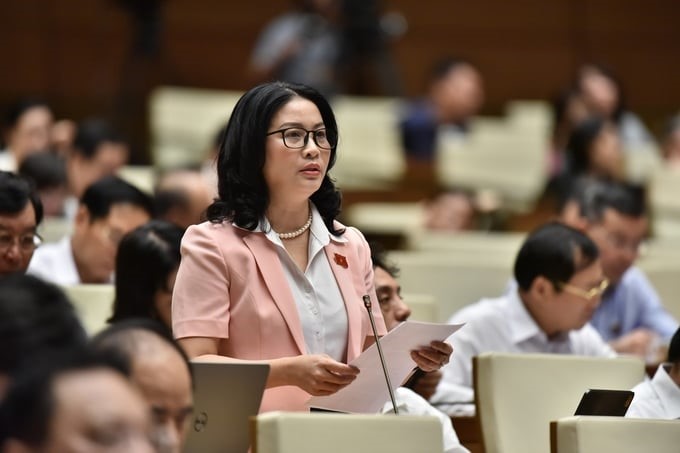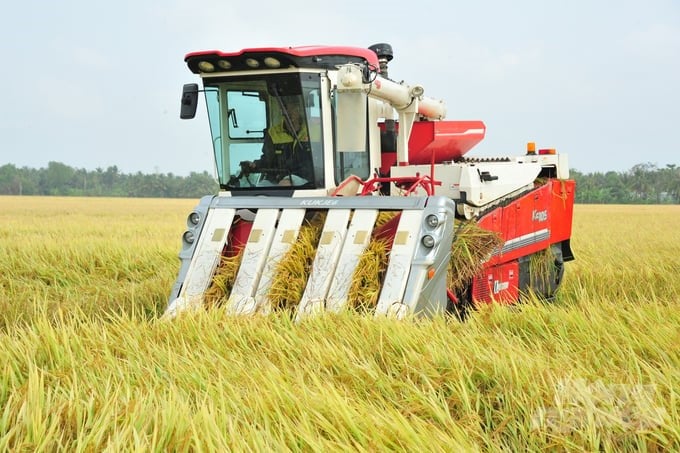November 27, 2025 | 20:31 GMT +7
November 27, 2025 | 20:31 GMT +7
Hotline: 0913.378.918
November 27, 2025 | 20:31 GMT +7
Hotline: 0913.378.918
On the morning of May 29, the National Assembly discussed the socio-economic performance and State budget in the 12 main solutions covering socio-economic fields that the Government has proposed for the coming time. Of which, solutions No. 4 and No. 7 mentioned agricultural economic development, especially the issue of greenhouse gas emission reduction and carbon credit transactions.
Ms. Nguyen Thi Lan, National Assembly Deputy and Director of the Vietnam National University of Agriculture (VNUA), said that this is a very important and necessary issue that needs to be given appropriate, timely, and regular attention to ensure the natural environment and stabilize economic life. Especially, help Vietnamese agriculture overcome the obvious challenges of the global green transformation revolution and continue to keep an important position in the world's food security map.

Ms. Nguyen Thi Lan, National Assembly Deputy and Director of the Vietnam National University of Agriculture, spoke at the session. Photo: VNUA.
According to Ms. Nguyen Thi Lan, Vietnamese agriculture plays an extremely important role, is an advantage, and is a pillar of the economy. Vietnam's agro-product export value reached about USD 54 billion in 2023, making an important contribution to the country's economy.
According to statistics, agriculture is the industry that generates large emissions of about 100 million tons of CO2 equivalent (accounting for 30%) of Vietnam's total greenhouse gas emissions. Of which, the rice growing industry accounts for 50%; the livestock industry accounts for 19%; land management and fertilizer use account for 13%; and the remaining is agricultural by-product and waste processing.
In recent times, to carry out the global green revolution and implement the Net Zero commitment on greenhouse gas emissions, many countries around the world, including countries considered Vietnam's export markets for agricultural products, have built technical barriers to reduce greenhouse gas emissions and carbon deficiency towards green and sustainable development. About 30 countries around the world have implemented carbon taxes. Specifically, since January 2025, to export its agricultural products to some markets, Vietnam needs to prove that the goods do not originate from deforestation. From January 2026, technical barriers on carbon emissions will be applied in some markets for Vietnam's agricultural products.
This is a huge challenge for many countries, especially for Vietnam and Vietnamese businesses. Without a plan and specific actions for the production of Vietnam's agricultural products for export associated with reducing greenhouse gas emissions, Vietnam's exported agricultural products will be charged additional carbon taxes from foreign countries, which increases export prices and loses the competitive advantage of Vietnamese agricultural products, especially in the context that many countries have built carbon border fences.

Agriculture generates large emissions of about 100 million tons of CO2 equivalent of Vietnam's total greenhouse gas emissions. Of which, the rice growing industry accounts for 50%. Photo: Le Hoang Vu.
Besides such challenges, if we pay attention in the right direction early, do it effectively and synchronously with a clear strategy and plan to reduce greenhouse gas emissions, and actively participate in the carbon credit market, it is possible to promote national agricultural advantages, increase the competitive position of agricultural products, bring high added value to agricultural production, and earn money from carbon credits.
National Assembly Deputy Nguyen Thi Lan also highly appreciated the Government's actions in committing to participate in the green revolution with countries around the world at COP 26 and COP 28 and being ready to participate in the carbon market. Vietnam has developed the Law on Environmental Protection 2020 and the Decree 06/2022/ND-CP stipulating measures to reduce greenhouse gas emissions and establish a carbon credit market. The Ministry of Agriculture and Rural Development has approved the plan to reduce greenhouse gas emissions in agriculture and rural development until 2030, with a vision to 2050, especially the project "Sustainable development of one million hectares specializing in high-quality and low-emission rice cultivation associated with green growth in the Mekong Delta until 2030." The project has a particularly important significance in contributing to implementing Vietnam's international commitments at COP26 on greenhouse gas emissions.
To help people deeply understand the great value as well as the challenges of reducing greenhouse gas emissions and the carbon market, and to be able to implement Vietnam's commitments at COP26 and COP28, National Assembly Deputy Nguyen Thi Lan made some recommendations:
First, widely disseminate the importance of reducing greenhouse gas emissions and the carbon market. Assign universities and VNUA to develop training programs to raise awareness, provide basic knowledge about the carbon market to people, businesses, and cooperatives, and teach university students and high school students. Organize practical training on applying technical solutions in agricultural production to reduce greenhouse gas emissions and on carbon market transactions.
Second, deeply research the impact of some countries' carbon market regulation on the export of Vietnamese agricultural products when this regulation is applied in January 2026, thereby providing appropriate response solutions to support people and businesses.
Third, build a scientific research program and develop attractive, specific, and practical policies to encourage people and businesses to actively participate in the carbon market for both sustainable development and increasing the value of the agricultural sector on the basis of lessons learned from EU countries, the Netherlands, the United States, Japan, etc.
Translated by Thu Huyen

(VAN) On November 27, in the meeting with Minister Tran Duc Thang, Mayor Yin Yong shared Beijing’s experience to improve environment and air quality.

(VAN) After 30 years, both sides identified strategic areas of cooperation: sustainable production, increasing coffee value and training for farmers.
/2025/11/27/4910-4-164708_294.jpg)
(VAN) On the afternoon of November 27 in Beijing, Minister of Agriculture and Environment Tran Duc Thang held a working session with several major Chinese enterprises operating in the agriculture and environment sector.

(VAN) The Department of Animal Health issued a provisional guideline requesting local authorities to increase surveillance, collect samples for testing, and conduct epidemiological investigations according to the established procedure.

(VAN) The United Nations recommends that Vietnam utilize data and artificial intelligence to enhance early disaster warnings and reduce GDP losses by 3.2% in the context of climate change.

(VAN) On the morning of November 27 in Beijing, Minister Tran Duc Thang and the Deputy Commissioner General of the General Administration of Customs of China signed a protocol on fresh jackfruit exports.

(VAN) As floodwaters recede, a vast network of irrigation works across eastern Gia Lai is emerging in a state of severe disrepair, with extensive damage demanding urgent restoration ahead of the 2025-2026 winter-spring cropping season.